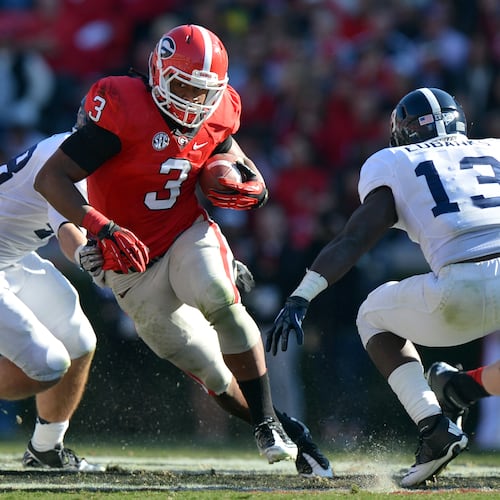After 10 games, this team continues to confound. After probably its best game of the season, Georgia Tech followed with perhaps its worst.
An offense that often hits its stride in November fairly galloped through the first half before getting blanked in the second. A defense that met the moment in stopping Virginia Tech a week ago was overrun for five touchdowns by a Duke team had scored five touchdowns in its previous four games.
A season often tells a story, such as Tech’s strong closing run last year when the defense found its footing, or the haywire 2015 season when injuries and Murphy’s Law took turns pulling the rug out from under the Yellow Jackets. Coach Paul Johnson’s 10th team resists such explanation, and the 43-20 loss to Duke may have been the apex for inexplicable results.
How to watch, listen to Saturday's game
What's the opening line for the game?
In general, Duke does not blow out opponents, and the Jackets do not lose by three touchdowns, and Saturday was both. By point differential, it was the third most decisive ACC win for the Blue Devils and the fourth most decisive conference defeat for the Jackets since 2008, when both Johnson and Duke counterpart David Cutcliffe began their administrations.
With 91 percent of the regular season in the books (unless athletic director Todd Stansbury can procure a 12th game), the Jackets are still looking for answers. This has been among the more perplexing teams in recent memory, a reality that is undoubtedly more vexing to Tech players and coaches than to their fans.
It has been frustrating, quarterback TaQuon Marshall said, “knowing that you do all you can do, but the results still aren’t what you want them to be.”
With an opportunity to build on the upset win over the Hokies and salvage one win from their road schedule, the Jackets offered up one of the weakest and most puzzling defensive efforts in defensive coordinator Ted Roof’s tenure, and Johnson’s as well. Duke had averaged 12.2 points and 285.7 yards in its six-game losing streak heading into Saturday’s game.
The Blue Devils scored their 13th point halfway through the second quarter and gained their 286th yard on the opening drive of the second half. The final damage – 43 points and an even 500 yards. After 11 turnovers in the six consecutive losses, Duke avoided any, although there were two fumbles and a near interception.
Johnson offered about as harsh an assessment as could be offered – “It was like we weren’t even out there.”
To Duke’s credit – the Blue Devils had shown previously they were capable of such offensive might, having lit up Northwestern for 41 points and 538 yards in the second game of the season. Perhaps Duke was just due to uncork.
Offensive coordinator Zac Roper “called a great run game,” Duke running back Brittain Brown said. “we wanted to rush for more yards than Georgia Tech did. If we do that going against a triple-option team, we felt we were going to win the game.”
After moving at will in the first half, the Jackets offense hit a wall, conjuring up memories of the second-half derailment in the slop at Miami. Against Duke, with the deficit increasing and compelled to rely on the pass, Tech averaged 3.8 yards per play in the second half after gaining 7.1 yards per play in the first. B-back KirVonte Benson said that the offense choked in the second half.
“It seems like a common trend that we’ve got to continue to work,” he said.
Going into Saturday’s Georgia game, there isn’t much sense of the team building to a finish. The flaws that have often hampered the Jackets continue to do so. A team that can win in impressive fashion against what has proven to be a pretty good Wake Forest team and a near top-25 team in Virginia Tech can also get waylaid by a Duke team that had lost six games in a row. A team that has come the closest of any team of defeating No. 3 Miami could well miss out on a bowl game.
Tech is not alone. College football’s great lure is not its capacity for consistently delivering expected outcomes.
By the matrix of most (if not all) Tech people, a win over Georgia – particularly this season – would undo frustration, absolve sins and render the meaning of the loss to Duke to one regrettable outlier.
“Everybody’s going to be ready to play,” Marshall said. “I mean, it’s Georgia.”
About the Author
Keep Reading
The Latest
Featured


